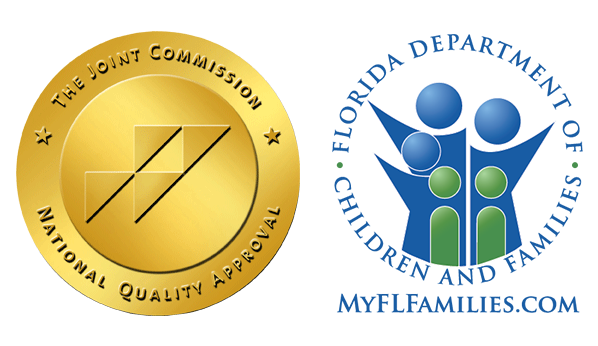There is no ‘one-size-fits-all’ program when it comes to addiction treatment. As each person is different, treatment programs should be tailored to meet your unique needs, meaning the optimum length, intensity, and treatment options vary from person to person.
Inpatient alcohol rehab involves a residential stay at a treatment center. Here, twenty-four-hour medical supervision, a safe and secure environment, and access to a community committed to your recovery goals are available. Unlike outpatient drug rehab centers in Florida, inpatient rehab removes the distractions and triggers of everyday life. It provides the space you need to heal and grow, enabling you to fully engage in your treatment program and overcome substance abuse.
Commencing with drug and alcohol detox, inpatient treatment also includes long-term addiction treatment and, when required, dual diagnosis treatment. You may stay with one rehab center throughout your treatment experience or detox in a separate facility.
While inpatient treatment involves taking a break from your everyday life, it is often the most effective option, especially for more severe alcohol addictions. It can be a life-changing experience that opens the door for a fulfilling sober life free from substance abuse.
What Is the Difference Between Inpatient and Outpatient Rehab?
Inpatient rehab includes remaining in an alcohol or drug rehab for the duration of your treatment program. Inpatient rehab centers typically boast accommodation facilities alongside treatment rooms and areas for exercise, rest, and relaxation. During your time in rehab, you will usually eat meals with others in recovery and follow a set structure to support your recovery experience.
In contrast, completing an outpatient program would see you visit a treatment center during the day to attend sessions while continuing to live at home. These particular rehabs help you recover from addiction while balancing work and family responsibilities. In some instances, if you attend outpatient rehab, you may choose to stay in specialist sober living facilities instead of returning home. Here, you will continue to receive medical support and care while cohabiting with others committed to the same recovery goals.
What Are the Benefits of Inpatient Alcohol Rehab Programs?
Inpatient addiction treatment programs offer a variety of benefits, especially for people with more severe addictions. Every drug rehab center is different, but residential stays typically share a range of common advantages.
Twenty-Four-Hour Medical Supervision
During inpatient rehab, medical professionals are on hand to offer support at all times of day and night. Recovery is not an easy process, and everyone goes through difficult times. For example, you may experience intense cravings, loss of motivation, or the physical effects of withdrawal. In these moments, you can talk to a psychologist, doctor, or another staff member to receive support, encouragement, or treatment.
A Safe and Comfortable Environment
An inpatient treatment facility offers a secure and safe environment, away from the triggers and distractions of everyday life. Alcohol is prohibited from the space, which reduces the possibility of relapse. You may also be shielded from environmental triggers, like places you usually drink or friends you drink with.
Treatment centers, like our own, usually nurture a comfortable and stress-free environment. They offer structured days and often have expert cooks and nutritionists on-site to prepare healthy and balanced meals. Specialized treatment facilities offer you the time and space to focus on your recovery experience while taking care of you.
A Supportive Community
Recovery from drug and alcohol addiction isn’t easy; it is a lifelong process that requires support from experts, loved ones, and the community around you.
Inpatient treatment centers offer the chance to develop strong bonds with other clients, which can be an invaluable source of support on your recovery journey. You may build lifelong friendships that can offer advice and encouragement in the years to come, even after you have left the center. It is also a great place to develop interpersonal skills so you can build and maintain mutually supportive relationships.
A Varied and Evidence-Based Treatment Program
According to the National Institute on Drug Abuse, effective alcohol and drug addiction treatment services offer various treatment options tailored to each client’s needs.
Alcohol treatment may involve a range of treatment approaches, including:
- Individual therapy
- Group therapy
- Family therapy
- Experiential activities
- Complementary therapies
- Medication-assisted treatment
- Dual diagnosis programs that treat any co-occurring disorders alongside substance addiction
- Life-skills support
As mentioned above, recovery is a lifelong process, and alcohol rehab centers typically offer ongoing support once you have left the center. They may connect you with an outpatient treatment program, recovery coach, or fellowship groups in your local area. Many Florida rehab centers offer an alumni program so you can stay connected to the place you achieve sobriety through events, retreats, and other services.
What Is Inpatient and Outpatient Detox?
Detox is usually the first stage in any drug or alcohol rehab program. It involves removing all traces of a substance and its harmful toxins from your body so you can fully engage in the rest of your addiction treatment program.
When you drink large amounts of alcohol over time, your body adjusts to the presence of the substance, leading you to develop alcohol dependence. When you stop drinking, you may experience a variety of withdrawal symptoms as your body readjusts.
In severe cases, alcohol withdrawal symptoms can be hazardous and even life-threatening. Because of this, accessing medical support and advice via a treatment provider as you progress through the detox process is essential.
Addiction treatment centers may offer inpatient or outpatient detox. Inpatient detox involves detoxing in a specialized facility with twenty-four-hour medical supervision. Outpatient centers involve regular visits to a treatment center for medical check-ups, prescriptions, and advice while you continue to live at home. Intensive outpatient programs may also be available.
Do I Need an Inpatient Detox?
The Substance Abuse and Mental Health Services Administration (SAMHSA) recommends inpatient detox for alcohol withdrawal due to the potentially life-threatening symptoms. However, in mild cases, outpatient detox may be suitable.
Before beginning any detox program, you must seek professional treatment advice. In doing so, the severity of your addiction, as well as other factors including the following, will be assessed:
- Your home environment
- Co-occurring mental health disorders
- Use of other substances as well as alcohol
Do Insurance Providers Cover Inpatient Rehab?
Many private health insurance providers at least partially cover inpatient rehab. When they do not, many American addiction centers and treatment providers can offer payment assistance and payment plans to help you access the treatment you need.
How Prevalent Is Alcohol Misuse in the United States and Across the Globe?
Alcohol is a normal part of many cultures. In most countries across the globe, it is legal, cheap, and easy to access. People have drunk alcohol for thousands of years at celebrations, with food, and on social occasions. According to the National Survey on Drug Use and Health (NSDUH), in 2019, 85.6 percent of adults over 18 said that they drank alcohol at least once during their life.
Unfortunately, alcohol’s widespread availability also makes it easy to abuse. However, alcohol abuse has a significant health, social, and economic burden worldwide. A 2014 World Health Organization report found that alcohol was the leading risk factor for death and disability in adults between 15 and 49. 5.3% of the burden of disease and injury worldwide is attributable to alcohol.
In the United States, nearly 14.5 million people had an alcohol use disorder (AUD) in 2019. In 2010, alcohol misuse cost the nation $249.0 billion.
Make the Change Today
If you are struggling with alcoholism or substance abuse, you are not alone. Beachcomber is a world-class Florida rehab center that supports thousands of clients in achieving long-term recovery and a fulfilling sober life. We combine compassionate care with expert clinical treatment to provide a healing experience tailored to your needs.












